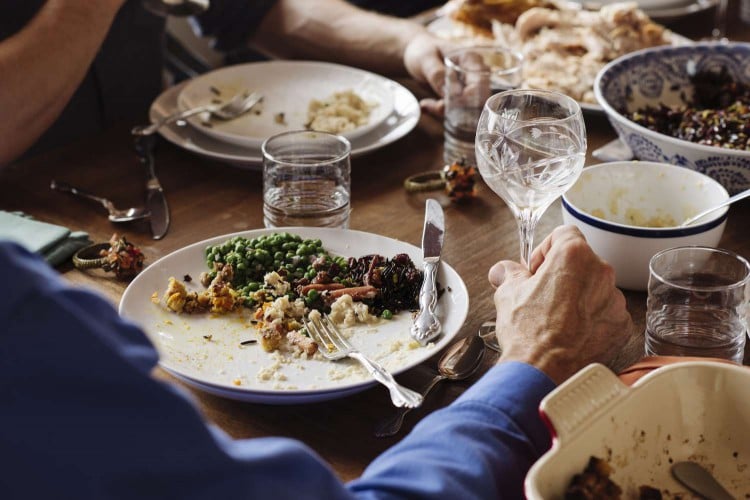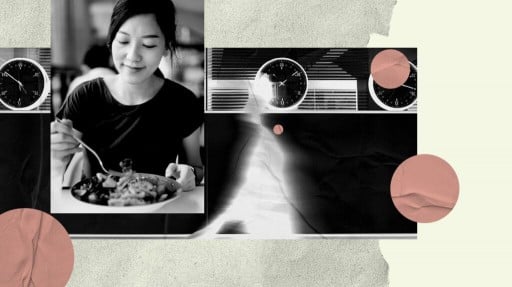- While holidays can interrupt your habits and routine, certain practices can keep you feeling your best.
- Prioritizing protein and fiber, avoiding skipping meals, and short walks after meals are all simple, easy ways to find balance this holiday season.
- Experts recommend not depriving yourself of certain foods, as that may lead to increased cravings and lack of satisfaction.
Holidays can sometimes be stressful when it comes to doing what makes you feel your best.
Food-centered holidays, like Thanksgiving, can pose challenges to nutritional needs, wants, and habits due to an interruption of routine and food patterns.
That said, it is possible to enjoy all the festivities the holidays have to offer while prioritizing your own health needs.
And no, that doesn’t mean opting out of that piece of pumpkin pie you really want.
Here are six tips registered dietitians recommend people do to find balance and feel their best over the Thanksgiving holiday.

Getty Images / The Good Brigade
Prioritize Protein and Fiber
While the sides might be everyone’s favorite part of Thanksgiving, remembering to add some protein and fiber to your plate will go a long way in feeling full and satisfied after dinner.
A balanced plate of food consists of protein, carbohydrates, fats, and a variety of color from fruits or vegetables. It is helpful to keep this same formula in mind even on Thanksgiving.
Carbohydrates such as potatoes, sweet potatoes, and stuffing provide energy and satisfy cravings while protein and fiber from fruits and vegetables help you feel full and satisfied.
Be sure to add turkey, carrots, and green beans to your plate and then fill in the gaps with your favorite carbohydrate side dishes. You can even start with a colorful salad or veggie-filled soup for extra fiber and antioxidants.
Don’t Skip Meals
Just because you know a big dinner is coming isn’t a reason to avoid eating for the first half of the day.
“If you show up to your Thanksgiving celebration starving, you’re way more likely to overeat. That’s not your lack of willpower showing, it’s just your biological need to eat,” Jamie Nadeau, RD, a registered dietitian whose focus is helping clients find balance with food, told Health.
“When you let yourself get too hungry, it’s much more difficult to make intentional, mindful food decisions,” Nadeau said.
Going into a meal starving often leads to more impulsive choices, eating too quickly, and overeating, instead of surveying the options and making mindful choices about what will make your body feel the best.
And, avoiding breakfast for the sake of a larger meal later in the day typically backfires. A 2020 study found that skipping breakfast does not have a significant effect on total calories consumed and can hurt overall diet quality.
Instead of skipping breakfast, start your day with protein and fiber, such as avocado toast and eggs, Greek yogurt and granola, or a veggie-packed egg scramble with whole wheat toast.
When lunchtime rolls around, try a salad with protein, cottage cheese, and vegetables, or a bean and vegetable chili.
By eating foods that you know support a healthy diet early in the day, you’ll be able to feel your best going into a Thanksgiving dinner with family and friends.
Practice Mindful Eating
Between an overwhelming amount of food, entertaining guests, or socializing with family, many factors can interfere with your ability to tune into your body and eat mindfully.
Mindful eating is a practice that harnesses your full attention to your experiences, cravings, and physical cues when eating.
When you eat mindfully, you have better awareness of your hunger and fullness cues and are less likely to overeat. You can also better distinguish between true hunger and an emotional or habitual reason for eating.
You can practice mindful eating at your Thanksgiving table by taking a few deep breaths before you sit down to dinner.
Try eating slowly, chew your food thoroughly, and not rush your meal. Take a moment to tune into all of your five senses.
- How does the food taste and smell?
- What is the texture of the food?
- What texture do I want to eat next?
- Am I taking breaths in between bites?
“The more mindful you eat, the more satisfied you will feel,” Palinski-Wade said, “which will help with portion control as well as cravings.”
Why Does Turkey Make You Sleepy? Here's What To Know About Tryptophan
Don’t Forget to Stay Hydrated
Drinking plenty of water and staying aware of alcohol consumption is a big tip for feeling your best all Thanksgiving day (and well into the weekend).
Just because holidays often provide extra opportunities for drinking doesn’t mean you have to always say “yes” to a refill.
Drinking alcohol reduces inhibitions, and can even trigger increased hunger that can lead to overeating. A 2019 study found that adults generally do not compensate for drinking alcohol by eating less and even modest alcohol intake may lead to increased food intake.
And, aside from the potential to binge, alcohol consumption without enough water can result in feelings of exhaustion, making you sluggish the next day.
To counter these negative consequences of alcohol consumption, make sure you’re drinking plenty of water in between your seasonal cocktails. Perhaps even consider a mocktail in place of a cocktail or two, to partake in the festivities without the fear of a hangover the next day.
Take a Quick Walk After Dinner
While Thanksgiving dinner may be the main event, there are plenty of fun, holiday activities that provide opportunities for movement as well.
Whether you like to participate in a community Turkey Trot, take a mid-day or after-dinner walk with your family, or play backyard football, “daily movement can boost energy, reduce stress, and elevate your mood,” said Palinski-Wade.
“It doesn’t need to be time-consuming either,” she said. “Even a short 10-minute walk can be enough to gain the benefits.”
After you eat, blood sugar and insulin levels rise. When insulin levels stay high, you feel more hungry for longer even if you just ate.
To counteract this, take a quick walk after dinner. This can help stabilize blood sugar and decrease insulin levels so that you feel more full and satiated.
Don’t Deprive Yourself of Your Favorite Foods
While your health goals are of course important and worth prioritizing, don’t stress out about sticking to them perfectly this Thanksgiving weekend.
Thanksgiving dinner is only one meal and no one meal is going to make or break your health.
“Remember that what you’re doing day-to-day is what matters most, so try not to stress if you eat more than you meant to,” Nadeau said. “After the meal is over, move on and go back to your normal habits.”
With this in mind, enjoy your favorite seasonal foods without restricting or critiquing yourself. Deprivation just leads to increased cravings and decreased mealtime satisfaction.
The One Healthy Thing Fitness Experts Always Do on Thanksgiving Day







